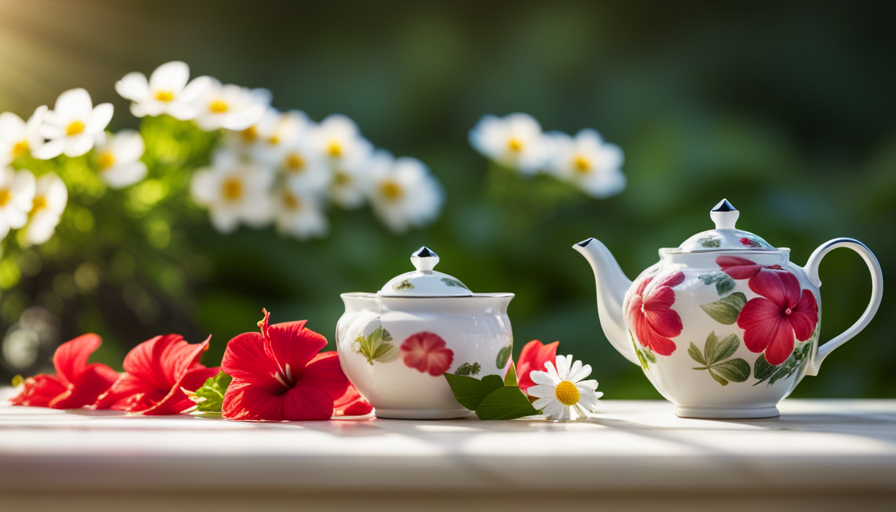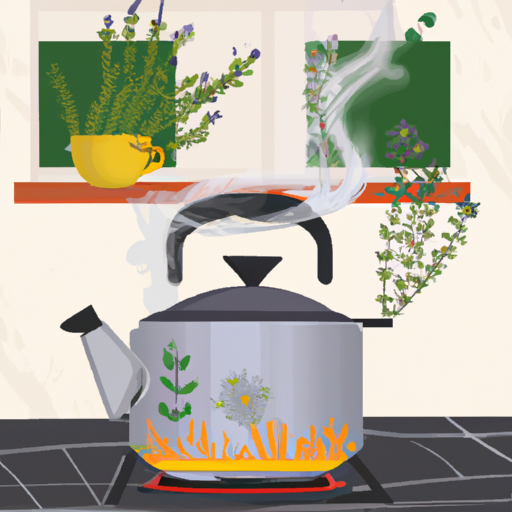You might have doubts regarding the claim that herbal tea can effectively reduce blood pressure. But can a basic cup of tea truly have an impact? The response is affirmative, and I am here to explain why.
Herbal tea has been used for centuries as a natural remedy for various ailments, and it turns out that certain teas can indeed help to lower blood pressure. But which ones are the most effective? In this article, I will explore the top herbal teas that have been scientifically proven to have a positive impact on blood pressure levels.
From the vibrant and tart hibiscus tea to the soothing and calming chamomile tea, there are a variety of options to choose from. Green tea, ginger tea, hawthorn tea, and more all have their own unique properties that can help to lower blood pressure.
So, if you’re looking for a natural way to improve your cardiovascular health, look no further than the power of herbal tea. Let’s dive into the evidence and discover which teas can help you on your journey towards better blood pressure.
Key Takeaways
- Hibiscus tea and green tea are herbal teas that have been shown to lower blood pressure.
- Chamomile tea and lavender tea can help reduce stress and promote relaxation, which may indirectly contribute to lower blood pressure.
- Ginger tea and hawthorn tea have properties that can help reduce hypertension and support heart health, potentially leading to lower blood pressure.
- Dandelion tea, olive leaf tea, and cinnamon tea have various beneficial properties that can contribute to blood pressure management and overall cardiovascular health.
Hibiscus Tea
If you’re looking for a delicious and refreshing way to help lower your blood pressure, hibiscus tea is a fantastic choice! Not only does it taste great, but it also offers numerous benefits for your overall health.
Hibiscus tea is made from the petals of the hibiscus flower, which are rich in antioxidants. These antioxidants help to reduce inflammation in the body and protect against damage caused by free radicals. Studies have shown that regularly consuming hibiscus tea can lead to a significant decrease in blood pressure levels. In fact, a review of multiple studies found that hibiscus tea was just as effective at lowering blood pressure as some prescription medications.
Aside from its blood pressure-lowering properties, hibiscus tea has many other benefits. It is known to improve digestion, boost the immune system, and promote healthy skin. Additionally, hibiscus tea is incredibly versatile and can be enjoyed in a variety of ways. You can drink it hot or cold, and there are countless recipes available that incorporate hibiscus tea into cocktails, smoothies, and even desserts.
Now let’s move on to the next section about green tea, another herbal tea that has been shown to have positive effects on blood pressure levels.
Green Tea
Interestingly, sipping on a cup of green tea is like taking a calming stroll through a lush, serene garden. Green tea, derived from the Camellia sinensis plant, has been consumed for centuries and is known for its numerous health benefits. Here are four reasons why incorporating green tea into your daily routine can help lower blood pressure:
-
Rich in antioxidants: Green tea is packed with antioxidants called catechins, which’ve been shown to have a positive effect on blood pressure levels.
-
Promotes relaxation: Green tea contains an amino acid called L-theanine, which’s been found to have a calming effect on the mind and body, helping to reduce stress and lower blood pressure.
-
Supports blood vessel health: The bioactive compounds in green tea have been shown to improve the function of the endothelial cells lining the blood vessels, promoting better blood flow and lower blood pressure.
-
Helps with weight management: Green tea has been linked to weight loss and maintenance, which can indirectly contribute to lower blood pressure levels.
To brew green tea, simply follow these steps:nn1) Boil water and let it cool for a few minutes.nn2) Place green tea leaves or tea bag in a cup.nn3) Pour the hot water over the tea leaves.nn4) Let it steep for 2-3 minutes, then enjoy.
Transitioning to the next section about chamomile tea, it’s important to explore other herbal teas that can also have a positive impact on blood pressure.
Chamomile Tea
Chamomile tea is a wonderful herbal beverage known for its calming effects on the nervous system. It’s been used for centuries to promote relaxation and reduce anxiety. Incorporating chamomile tea into my daily routine has been a game-changer. It’s helped me unwind after a long day and prepare for a restful night’s sleep.
Its calming effects on the nervous system
One amazing thing about herbal tea is how it can relax your nervous system, making it a great option for those looking to lower their blood pressure.
Chamomile tea, in particular, has been known for its calming effects on the nervous system. It can help reduce stress levels by promoting relaxation and tranquility. This can have a positive impact on sleep quality, allowing for a better night’s rest.
When it comes to incorporating chamomile tea into your daily routine, there are a few options to consider. You can enjoy a cup of chamomile tea before bed to help you unwind and prepare for a restful sleep. Alternatively, you can incorporate chamomile tea into your morning routine to start the day off on a calm and balanced note.
Whichever way you choose, chamomile tea can be a soothing addition to your daily self-care routine.
How to incorporate chamomile tea into your daily routine
To incorporate chamomile tea into your daily routine, try enjoying a cup before bed for a calm and restful sleep. Brewing chamomile tea is simple and can be done by steeping 2-3 teaspoons of dried chamomile flowers in hot water for about 5 minutes.
This gentle herbal infusion’s been used for centuries due to its numerous health benefits. Chamomile tea’s known for its anti-inflammatory properties, which can help reduce blood pressure levels. Additionally, it contains flavonoids that promote relaxation and reduce anxiety, aiding in a good night’s sleep. Its mild, floral taste’s soothing and can be enhanced with a touch of honey or lemon.
As we transition to discussing ginger tea, let’s explore the benefits of this invigorating herbal brew.
Ginger Tea
Ginger tea is a delicious and refreshing option that can potentially lower blood pressure. Not only does it have a unique flavor, but it also offers a range of health benefits. Ginger tea is made by steeping fresh or dried ginger root in hot water. It is known for its anti-inflammatory properties, which can help reduce hypertension and improve heart health. Additionally, ginger tea acts as a natural blood thinner, preventing blood clots and reducing the risk of cardiovascular diseases.
Here is a table summarizing some of the benefits of ginger tea:
| Benefits of Ginger Tea |
|---|
| Reduces inflammation |
| Lowers blood pressure |
| Improves heart health |
| Prevents blood clots |
| Boosts immune system |
| Eases digestion |
To make ginger tea, simply slice fresh ginger and steep it in boiling water for about 10 minutes. You can also add lemon or honey for added flavor. It is recommended to drink two to three cups of ginger tea per day to reap its full benefits.
Moving on to the next topic, hawthorn tea, it is another herbal tea that has been traditionally used to support cardiovascular health.
Hawthorn Tea
Moving on to the next topic, let’s explore the remarkable benefits of hawthorn tea for cardiovascular health. Hawthorn tea is derived from the leaves, flowers, and berries of the hawthorn plant, which has been used for centuries in traditional medicine for its medicinal properties.
Here are three key benefits of hawthorn tea:
-
Lowers blood pressure: Studies have shown that hawthorn tea can help reduce high blood pressure. The tea contains compounds that relax blood vessels, allowing for better blood flow and lower blood pressure levels.
-
Supports heart health: Hawthorn tea has positive effects on heart health. It can improve heart function, strengthen the heart muscle, and enhance blood circulation. Regular consumption of hawthorn tea may reduce the risk of heart diseases such as heart failure and coronary artery disease.
-
Reduces cholesterol levels: High cholesterol is a risk factor for cardiovascular diseases. Hawthorn tea has been shown to lower cholesterol levels, particularly LDL or ‘bad’ cholesterol. By reducing cholesterol, hawthorn tea can help improve overall cardiovascular health.
When it comes to dosage, it’s recommended to drink 1-2 cups of hawthorn tea per day. However, it’s important to consult with a healthcare professional before starting any herbal regimen, as individual needs may vary.
Transitioning to the subsequent section on dandelion tea, let’s now explore its benefits for blood pressure management.
Dandelion Tea
Discover the remarkable benefits that dandelion tea brings to your cardiovascular health, as it supports your overall well-being and aids in managing your blood pressure. Dandelion tea has been used for centuries as a natural remedy for various health conditions, including high blood pressure. This herbal tea contains compounds that have diuretic properties, helping to remove excess fluid from the body and reduce blood volume, which in turn can lower blood pressure.
In addition to its diuretic effects, dandelion tea is rich in antioxidants, which play a crucial role in protecting the cardiovascular system from oxidative stress and inflammation. These antioxidants help to improve blood flow, prevent the formation of blood clots, and reduce the risk of heart disease.
To make dandelion tea, start by harvesting fresh dandelion leaves and roots. Rinse them thoroughly and chop them into small pieces. Boil water and steep the chopped leaves and roots for about 10 minutes. Strain the tea and enjoy it hot or cold.
Transitioning into the subsequent section about oolong tea, this traditional Chinese tea has also been associated with numerous health benefits, including promoting heart health and reducing blood pressure.
Oolong Tea
I’ve come across some interesting research on oolong tea and its potential blood pressure-lowering effects. Studies have shown that regularly consuming oolong tea may help to reduce blood pressure levels.
Additionally, it’s worth noting that there are some differences between oolong, green, and black tea when it comes to their processing methods and caffeine content. These differences may influence their effects on blood pressure.
Research on its blood pressure-lowering effects
One fascinating study found that regularly drinking hibiscus tea can lead to a significant decrease in blood pressure. This natural remedy for hypertension offers an alternative to blood pressure medication. Here are four reasons why hibiscus tea is effective in lowering blood pressure:
-
Antioxidant properties: Hibiscus tea is rich in antioxidants, which help reduce inflammation and oxidative stress, contributing to lower blood pressure levels.
-
ACE inhibitor activity: Hibiscus tea acts as a natural ACE inhibitor, inhibiting the enzyme responsible for constricting blood vessels and increasing blood pressure.
-
Diuretic effect: Hibiscus tea has diuretic properties, promoting the excretion of excess fluids and sodium, which can contribute to lower blood pressure.
-
Relaxing blood vessels: The compounds in hibiscus tea help relax the walls of blood vessels, allowing for better blood flow and lower blood pressure.
Understanding the blood pressure-lowering effects of hibiscus tea sets the stage for exploring the differences between oolong, green, and black tea.
Differences between oolong, green, and black tea
After exploring the research on herbal teas and their blood pressure-lowering effects, it’s important to understand the differences between oolong, green, and black tea.
Oolong tea, known for its unique taste and aroma, is semi-oxidized, falling between green and black tea in terms of processing.
Green tea, on the other hand, is unoxidized and retains a high level of antioxidants. It’s been associated with various health benefits, including improved heart health and lower blood pressure.
Black tea, fully oxidized and rich in flavor, also has potential blood pressure-lowering effects. However, it’s important to note that the specific health benefits of each tea can vary depending on factors like brewing time and temperature.
Understanding these differences can help us make informed choices when it comes to our tea preferences.
Now, let’s transition into the subsequent section about lavender tea…
Lavender Tea
To lower your blood pressure, try drinking lavender tea – it’s a natural remedy that can be a soothing addition to your daily routine. Lavender tea is made from the dried flowers of the lavender plant, which is known for its calming properties and delightful fragrance. This herbal tea not only offers a pleasant taste but also provides several health benefits.
Lavender tea is rich in antioxidants, such as polyphenols, which help protect the body against oxidative stress and inflammation. These antioxidants have been found to have a positive impact on cardiovascular health, including lowering blood pressure. Additionally, lavender tea contains compounds that promote relaxation and reduce anxiety, which can indirectly contribute to lowering blood pressure.
To prepare lavender tea, you can follow this simple recipe:
- Boil 1 cup of water.
- Add 1-2 teaspoons of dried lavender flowers to a tea infuser or teapot.
- Pour the boiling water over the lavender flowers.
- Let it steep for 5-10 minutes.
- Strain the tea and enjoy.
Incorporating lavender tea into your daily routine can be a soothing and enjoyable way to support your overall well-being. Now, let’s transition to the next section and explore the benefits of olive leaf tea.
Olive Leaf Tea
After exploring the potential benefits of Lavender Tea, I’m now excited to delve into the world of Olive Leaf Tea.
Olive leaf extract has long been used in traditional medicine for its numerous health benefits. This herbal tea, made from the leaves of the olive tree, is known for its potential to lower blood pressure.
Olive leaf tea contains a variety of bioactive compounds, including oleuropein, which has been found to have antioxidant and anti-inflammatory properties. These properties may help reduce blood pressure by improving blood vessel function and reducing inflammation in the body.
In addition to its potential to lower blood pressure, olive leaf tea is also believed to have other health benefits. It may help boost the immune system, support cardiovascular health, and have antimicrobial properties. Some studies have even suggested that olive leaf extract may have anticancer effects, although more research is needed to fully understand its potential in this area.
Overall, olive leaf tea is a natural and holistic option for those looking to lower their blood pressure and support their overall health.
As we continue our exploration of herbal teas, let’s now turn our attention to the benefits of cinnamon tea.
Cinnamon Tea
Get ready to experience the warm and comforting benefits of cinnamon tea, which can help regulate your body’s natural balance and support a healthy cardiovascular system. Cinnamon tea isn’t just delicious but also offers numerous health benefits. Here are some ways cinnamon tea can benefit your health:
-
Boosts heart health: Studies have shown that cinnamon tea can help lower blood pressure and reduce the risk of heart disease. Its active compounds, like cinnamaldehyde, help relax blood vessels and improve blood flow.
-
Regulates blood sugar levels: Cinnamon tea may help regulate blood sugar levels by increasing insulin sensitivity. This can be particularly beneficial for individuals with diabetes or those at risk of developing the condition.
-
Supports weight management: Cinnamon tea can aid in weight management by reducing cravings and increasing metabolism. It also helps stabilize blood sugar levels, which can prevent overeating and promote healthy weight loss.
When it comes to enjoying cinnamon tea, there are various recipes you can try. You can simply steep a cinnamon stick in hot water for a few minutes or add cinnamon powder to your favorite herbal tea blend. For added flavor, you can also mix in some honey or lemon. Remember to consult with a healthcare professional before incorporating any new herbal tea into your routine, especially if you have any existing health conditions or are taking medications.
Frequently Asked Questions
Can herbal tea completely replace blood pressure medication?
While herbal tea may have potential benefits for lowering blood pressure, it can’t completely replace blood pressure medication.
There are various factors that contribute to high blood pressure, and medication is often necessary to effectively manage it.
While herbal tea can be a complementary addition to a healthy lifestyle, it’s important to consult with a healthcare professional to determine the best course of treatment and to understand any potential risks or interactions.
How long does it take for herbal tea to lower blood pressure?
The duration of herbal tea’s effects on lowering blood pressure can vary depending on the individual and the specific herbal tea used. Different herbal teas have been shown to have varying levels of effectiveness in reducing blood pressure.
It’s important to note that herbal tea shouldn’t be relied upon as the sole method for managing blood pressure, and it’s recommended to consult with a healthcare professional to develop a comprehensive treatment plan.
Are there any side effects of consuming herbal tea for lowering blood pressure?
There are potential risks and interactions with medications when consuming herbal tea for lowering blood pressure. It’s important to be aware of these factors before incorporating it into your routine.
One interesting statistic is that herbal tea can interact with certain medications, leading to adverse effects. It’s crucial to consult with a healthcare professional to ensure the safety and effectiveness of herbal tea for your specific situation.
What is the recommended dosage of herbal tea for managing high blood pressure?
When it comes to managing high blood pressure, it’s important to consider the recommended dosage of herbal tea. To evaluate its effectiveness, it’s crucial to follow the guidelines provided by healthcare professionals.
The recommended dosage can vary depending on the specific herbal tea being used. It’s always best to consult with a healthcare provider to determine the appropriate dosage for your individual needs. This will ensure that you’re taking the herbal tea safely and effectively.
Can pregnant or breastfeeding women safely consume herbal tea for blood pressure management?
Safety concerns should be taken into consideration when pregnant or breastfeeding women are considering consuming herbal tea for blood pressure management. While herbal teas can offer alternative remedies for managing high blood pressure, it’s important to consult with a healthcare professional before incorporating them into your diet.
Some herbal teas may contain ingredients that could potentially be harmful during pregnancy or while breastfeeding. Therefore, it’s crucial to prioritize the safety of both the mother and the baby when making decisions about consuming herbal teas.
Conclusion
In conclusion, there are several herbal teas that have been shown to lower blood pressure and promote overall cardiovascular health. One interesting statistic that may evoke an emotional response is that, according to a study published in the Journal of Nutrition, drinking hibiscus tea daily for six weeks resulted in a significant decrease in systolic blood pressure. The average reduction was 7.2 mmHg. This highlights the potential of herbal teas as a natural and effective way to manage blood pressure and improve heart health.










